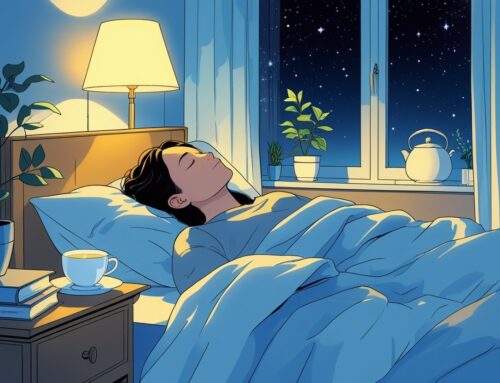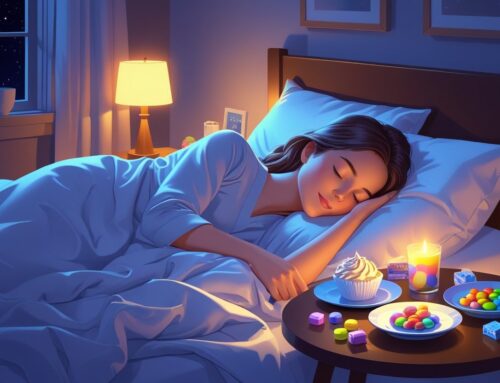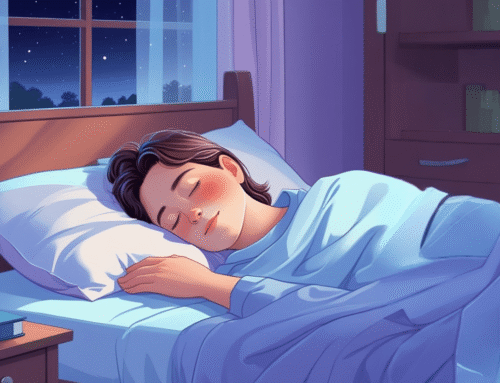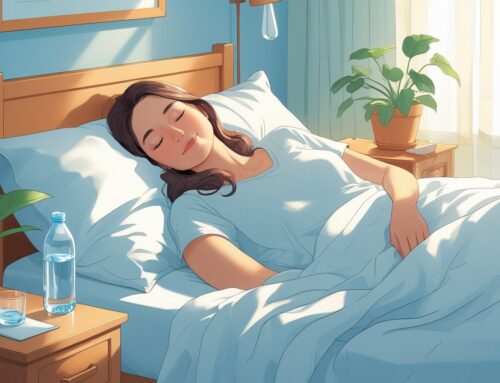Many people struggle to get a good night’s sleep and seek ways to improve it without relying on strong medications. Natural remedies for sleep offer gentle yet effective support through herbs, supplements, and simple lifestyle changes. These methods calm both the mind and body, which helps make falling asleep easier.
Some well-known natural sleep aids include chamomile, valerian, and lavender. These herbs have a long history of use and may reduce the time it takes to fall asleep while also improving overall sleep quality. In addition to herbal remedies, practices such as relaxation exercises and regular physical activity can also enhance sleep naturally.
Knowing how these remedies work and choosing the right ones can help address sleep issues without the risk of harsh side effects.
Key Takeaways
- Natural solutions offer a gentler path to better sleep without relying on medication.
- Simple lifestyle habits can boost sleep quality when used with natural aids.
- Using a mix of gentle methods often leads to more consistent sleep.
- Combining natural sleep remedies like chamomile or melatonin with a supportive mattress creates a balanced sleep environment that soothes the mind, relieves pressure points, and promotes deeper and more restful sleep.
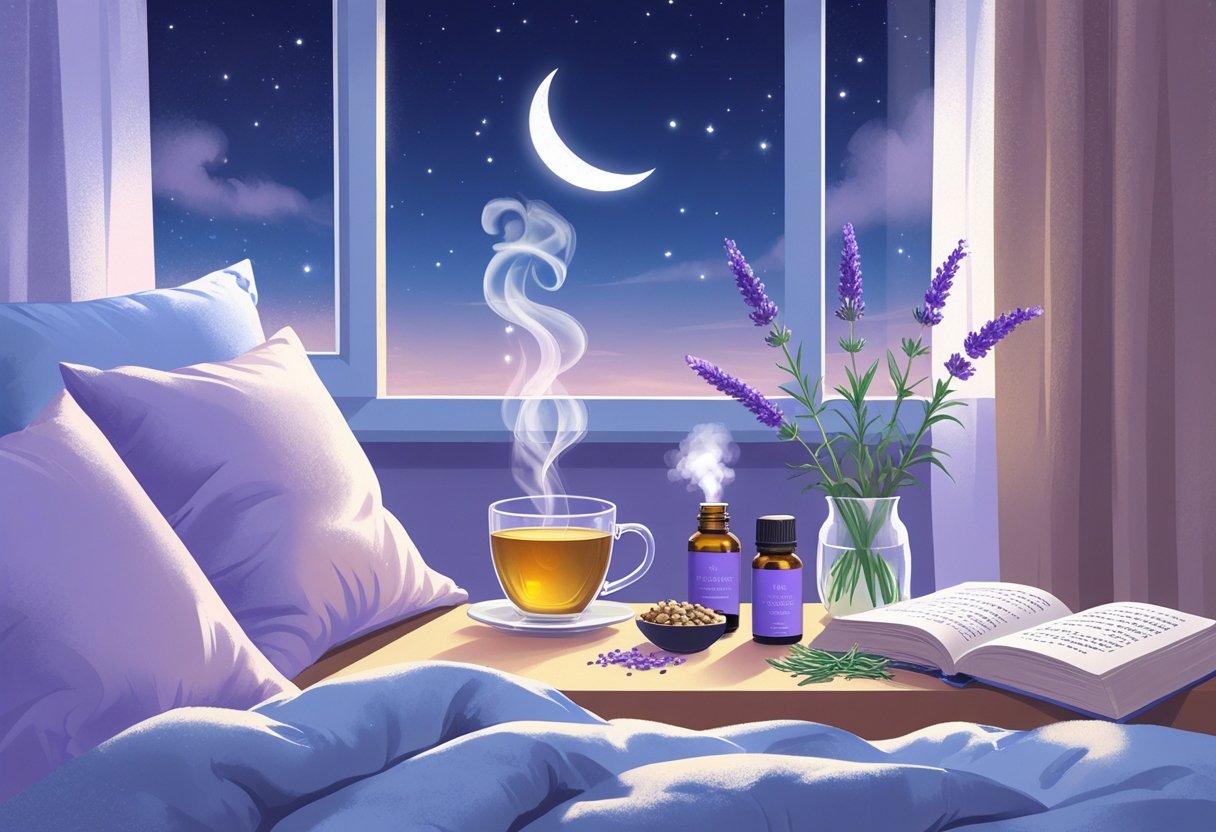
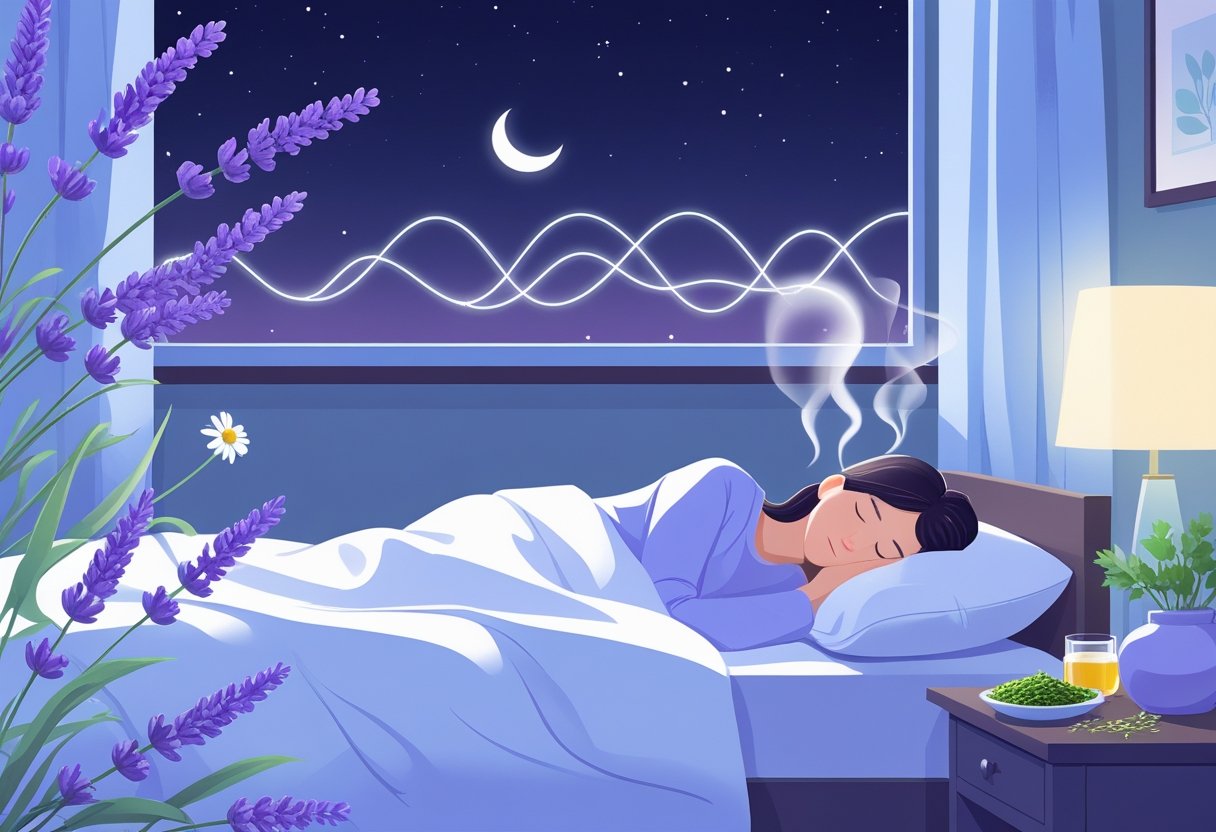
Sleep plays a critical role in how the body and mind function each day. Many sleep problems result from a mix of health conditions, lifestyle habits, and environmental factors. Understanding what disrupts sleep allows people to find natural ways to fall asleep and improve overall sleep quality.
Why Sleep Is Essential
Sleep allows the body to repair cells, support brain function, and sustain long-term health. During sleep, the brain sorts through memories and organizes information collected throughout the day. Without enough high-quality rest, memory, focus, and decision-making abilities tend to decline.
Sleep also stabilizes mood and helps the body manage stress. Too little sleep increases the risk of heart disease, diabetes, and a weakened immune system. Most adults require 7 to 9 hours of sleep each night to stay alert and healthy. Finding effective ways to sleep better can lead to more energy during the day and stronger health over time.
Common Sleep Disorders
Sleep disorders disrupt natural sleep rhythms. The most common is insomnia, which causes difficulty falling asleep or staying asleep. Those with insomnia often feel exhausted during the day, which affects both performance and emotional well-being.
Other conditions include sleep apnea, which interrupts breathing during sleep, and restless legs syndrome, which creates an urge to move the legs due to discomfort. These disorders reduce the quality of sleep and leave people feeling unrested. Recognizing the symptoms of sleep disorders helps guide treatment choices or explore home remedies for insomnia.
Cause of Poor Sleep
Many factors can lead to poor sleep, including stress, irregular sleep schedules, and diet. Screen use before bed, late-day caffeine, or alcohol disrupts the body’s ability to fall asleep naturally.
Environmental issues such as noise, light, or an uncomfortable mattress also reduce sleep quality. Health problems like chronic pain, anxiety, or medication side effects often interfere with rest. Creating a sleep-friendly bedroom and following a consistent bedtime routine helps improve sleep and ease insomnia symptoms.
Improving sleep naturally requires specific actions and daily adjustments. Consistent habits, a calm environment, and relaxing routines contribute to falling asleep faster and getting better rest.
Lifestyle Changes for Better Sleep
Certain lifestyle habits promote better sleep. Regular exercise earlier in the day helps regulate the sleep cycle. Avoid caffeine and heavy meals close to bedtime, as both can disrupt sleep. Reducing screen time before bed improves sleep quality. Blue light from phones or computers interferes with melatonin, the hormone that signals sleep. Instead, try reading a book or listening to calming music.
Natural drinks like warm milk, chamomile tea, or tart cherry juice offer mild calming effects that support sleep. Avoid alcohol since it disrupts normal sleep patterns.
Creating a Sleep-Friendly Environment
A restful bedroom stays dark, quiet, and cool. Use blackout curtains or eye masks to block light and support melatonin production. Earplugs or white noise machines reduce disruptive sounds. Keep the room temperature between 60 and 67 degrees Fahrenheit. Extreme temperatures can cause restlessness. Supportive mattresses and pillows improve comfort and alignment.
Eliminate distractions such as TVs, computers, or bright clocks from the bedroom. A space reserved for sleep helps the brain associate it with rest, which makes it easier to fall asleep.
Bedtime Routines and Habits
A consistent sleep and wake schedule sets the body’s internal clock. Sleeping and waking at the same time every day, including weekends, reinforces natural rhythms. Use relaxation techniques like mindfulness or gentle yoga before bed to lower stress and calm the body. Calming scents, such as lavender oil in a diffuser, create a peaceful atmosphere.
Avoid mentally or physically demanding tasks close to bedtime. Choose relaxing activities instead to help the mind shift into sleep mode, an essential step toward falling asleep naturally.
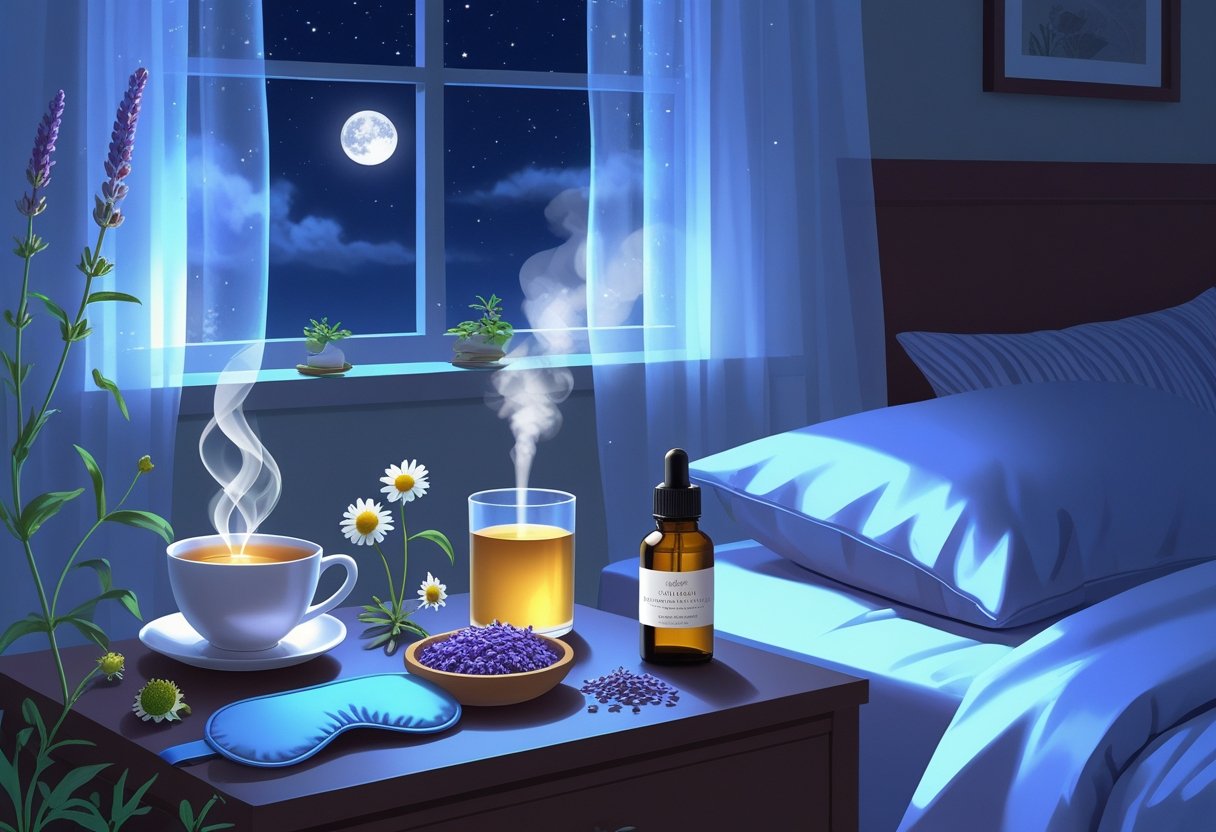
What someone eats and drinks can influence how well they sleep. Certain foods relax the body and lead to faster sleep, while others disrupt deep rest and reduce sleep quality. Choosing the right options provides a natural way to support better sleep.
Foods That Promote Sleep
Some foods naturally improve sleep by promoting relaxation or triggering the release of sleep-regulating hormones. For instance, complex carbohydrates such as whole-wheat toast or oatmeal encourage the release of serotonin, a calming brain chemical.
Cherries and kiwi have natural melatonin, the hormone that governs sleep cycles, and may improve deep sleep. Fatty fish like salmon supplies omega-3 fatty acids, which reduce inflammation and contribute to more stable sleep patterns.
Nuts, especially almonds and walnuts, deliver magnesium and melatonin, both of which relax muscles and support sleep onset. A small portion of these foods before bed can serve as natural sleep aids.
Beverages to Avoid Before Bedtime
Certain drinks stimulate the brain or irritate the stomach. Caffeine, found in coffee, tea, and many sodas, acts as a strong stimulant. Stop intake at least 10 hours before sleep to avoid difficulty falling or staying asleep.
Alcohol may cause drowsiness at first, yet it breaks down in the body and leads to restless sleep. Avoid it at least three hours before bed. Heavy or sugary drinks also cause indigestion or increase the chances of waking up during the night. Instead, opt for warm milk, chamomile tea, or tart cherry juice—beverages that support sleep without interrupting rest.
Nutrients That Support Restful Sleep
Several nutrients help the body relax and enter deeper stages of sleep.
Magnesium calms the nervous system and is found in leafy greens, nuts, and seeds. Tryptophan, an amino acid found in turkey, dairy, and eggs, produces both serotonin and melatonin. Including it in meals can improve sleep quality. Vitamin B6 helps the body convert tryptophan into melatonin. It appears in fish, bananas, and fortified cereals. A balanced intake of these nutrients supports natural sleep and encourages deeper rest.
Eating meals rich in these nutrients well before bedtime strengthens sleep cycles and promotes overall restfulness.
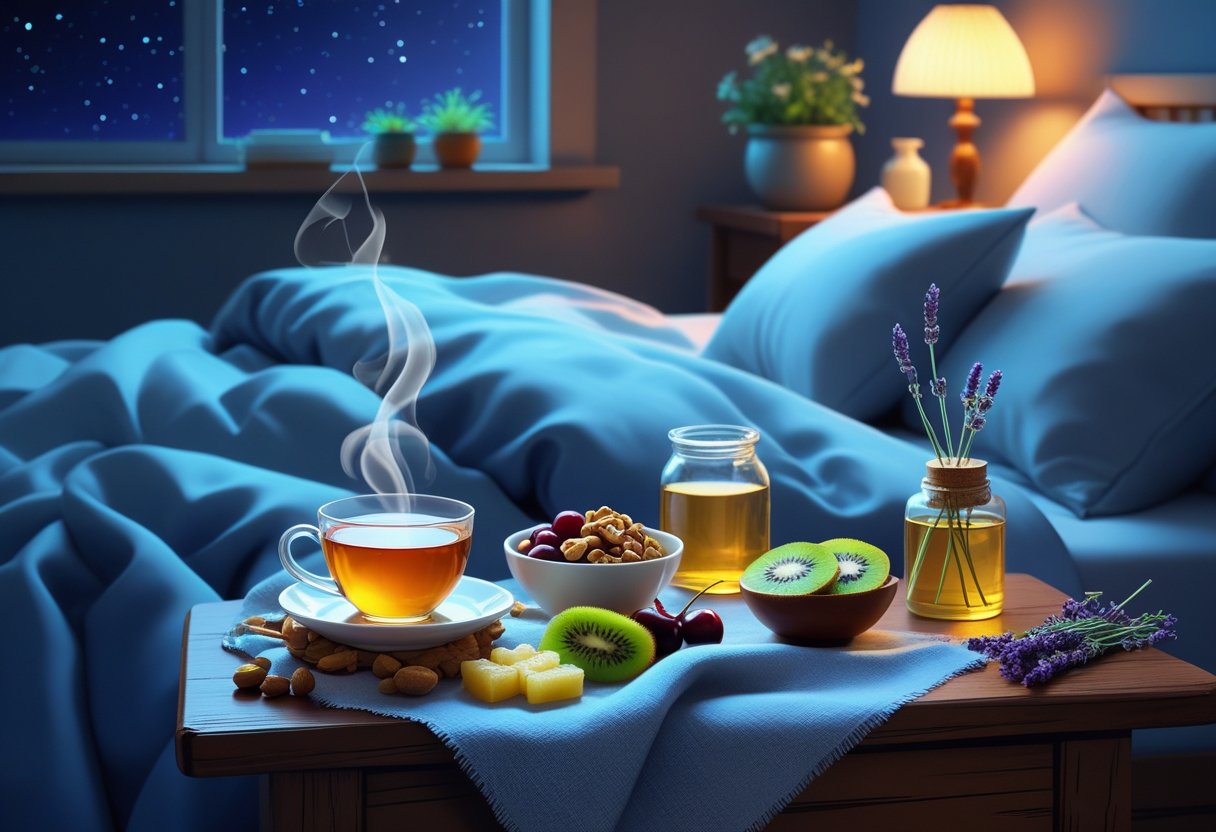
Many natural sleep aids derive from plants and gentle homeopathic treatments. These options often support relaxation and assist with mild insomnia without harsh side effects. Some herbs and remedies have undergone more study than others for their ability to improve sleep quality and reduce restlessness.
Best Herbs for Sleep
Several herbs have calming effects that make them popular natural remedies for insomnia. Chamomile is well known for its mild sedative properties as well as anti-inflammatory effects. People often use it as a tea or extract to encourage relaxation.
Valerian root serves as another common herbal sleep aid. It may shorten the time it takes to fall asleep and improve sleep quality over time. Although some find its effects stronger, its taste tends to be less pleasant.
Lavender is widely used for sleep and stress relief. It can be inhaled as an essential oil or taken as a dried herb. Other herbs, such as passionflower and lemon balm, also provide calming properties that may ease mild sleep problems.
Popular Homeopathic Sleep Remedies
Homeopathy offers gentle options targeting specific sleep issues like anxiety or overactive thoughts.
Remedies such as Coffea cruda address sleeplessness caused by racing thoughts or sensitivity. Nux vomica often appears in cases related to stress, irritability, or poor habits. It supports the nervous system and may relieve insomnia linked to overstimulation. Silicea (Silica) stands as another homeopathic remedy used to improve sleep and promote bodily relaxation. These treatments work best when tailored to the individual’s symptoms.
Herbal Teas and Supplements
Drinking herbal teas provides a simple way to benefit from natural herbs for sleep. Chamomile tea remains one of the most popular choices, frequently consumed before bedtime to encourage relaxation. Tart cherry juice acts as another natural remedy since it contains melatonin, the hormone that regulates sleep.
Supplements like chamomile extract capsules prove effective in controlled doses, particularly for older adults. Magnesium and L-theanine supplements support relaxation and enhance sleep quality when taken consistently. Many people combine these teas and supplements for a mild yet effective approach to better sleep.
Aromatherapy for Sleep
Plant-based oils are used in aromatherapy to help people relax and clear their minds. It is frequently used to enhance the general quality of sleep and has been extensively researched. Before going to bed, a lot of people add essential oils to their bathwater, pillow sprays, or diffusers.
By lowering anxiety and fostering a calming environment, other essential oils like lavender, chamomile, and cedarwood may also promote sleep.
Aromatherapy frequently intensifies the benefits of other natural sleep aids without posing risks or adverse effects.
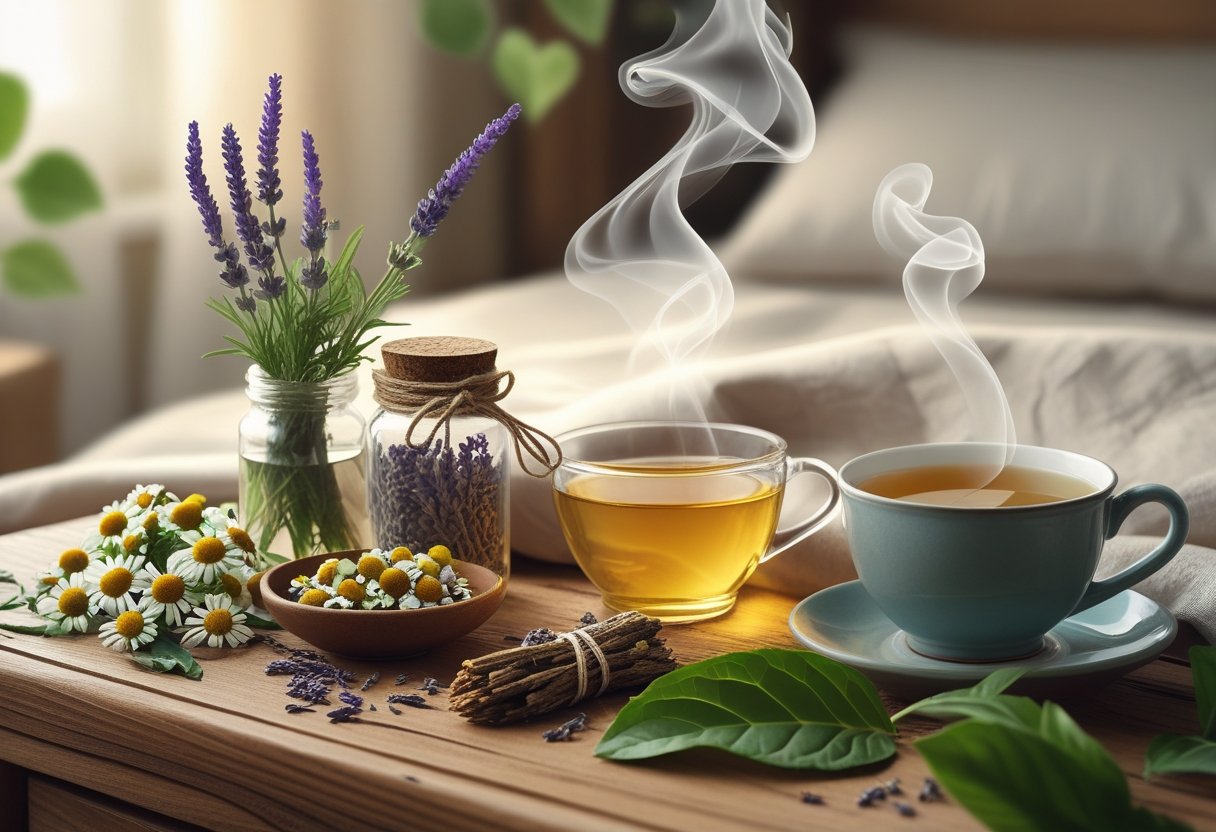
Many people turn to natural options to improve sleep quality without relying on prescription drugs. Various supplements support relaxation and ease falling asleep by using plant extracts or natural hormones.
Types of Natural Sleep Supplements
Natural sleeping pills often contain ingredients such as valerian root, lavender, GABA, kava, and California poppy. These supplements work to calm the nervous system and promote relaxation.
- Valerian root remains a common choice, available as teas or pills, and helps reduce the time it takes to fall asleep.
- Lavender frequently appears in aromatherapy or supplements because of its calming effects.
- GABA, a neurotransmitter, some supplements used to reduce anxiety and enhance sleep.
- Kava may aid sleep but requires caution due to potential liver risks.
- California poppy, though less common, sometimes provides mild sedation.
Since these supplements differ in effectiveness and safety, selecting products carefully becomes essential, and consulting a doctor is advisable if needed.
Melatonin and Its Alternatives
Melatonin is a hormone produced by the body to regulate the sleep-wake cycle. It is widely available as a natural sleep supplement intended to reset sleep patterns, especially for jet lag or shift work. Some individuals seek melatonin alternatives to avoid hormones or when melatonin proves ineffective. Alternatives include:
- Tart cherry juice, which contains natural melatonin and antioxidants.
- Chamomile tea, known for its mild calming effects without hormones.
- Supplements like valerian root, which focus on relaxation rather than sleep cycle regulation.
While melatonin can prove effective, other natural sleep supplements might offer similar benefits with fewer side effects for some users.
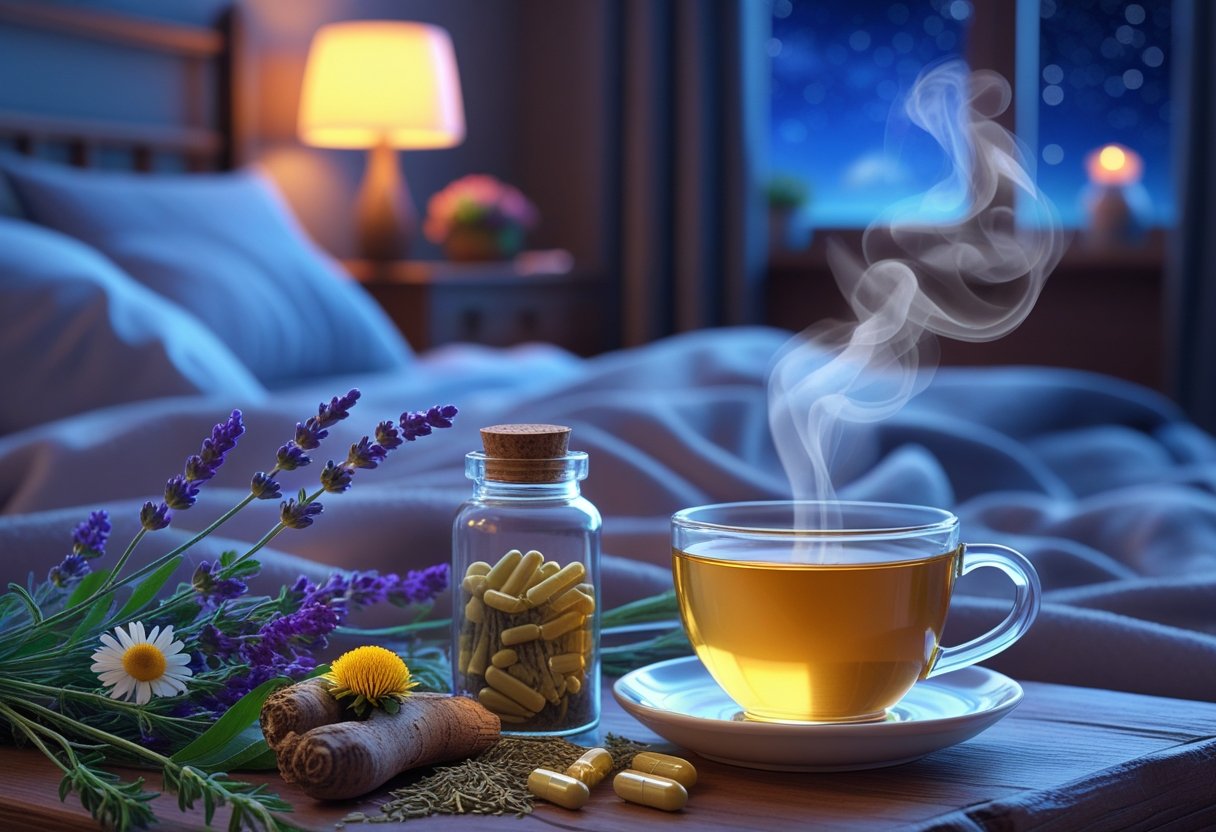
Relaxation techniques calm the mind and body, which makes it easier to fall asleep quickly. These methods lower stress and reduce the physical tension that keeps people awake. Using simple and focused practices consistently improves the quality of natural sleep and supports deeper rest.
Breathing Exercises
Slow, deep breathing serves as a basic yet effective way to trigger relaxation. Focusing on long, even breaths slows the heart rate and lowers blood pressure, signaling the body to shift into a restful state. One popular method is the 4-7-8 technique: inhale quietly through the nose for 4 seconds, hold the breath for 7 seconds, then exhale slowly through the mouth for 8 seconds. Repeating this cycle several times quiets a racing mind.
Breathing exercises require no equipment and work anywhere. Practicing them before bed shortens the time it takes to fall asleep and promotes natural and deep sleep.
Meditation and Mindfulness
Meditation and mindfulness encourage awareness of the present moment, reducing worry about the past or future. This mental focus eases anxious thoughts that often interfere with sleep.
Following guided meditation before bed, whether through recordings or apps, promotes relaxation by directing attention to calm, steady breathing or peaceful images. Mindfulness also includes observing thoughts without judgment and gently bringing focus back to the breath.
Regular meditation improves overall sleep quality and speeds up falling asleep. These techniques serve as natural remedies for deep sleep by reducing mental noise that disrupts rest.
Progressive Muscle Relaxation
Progressive muscle relaxation (PMR) involves tensing then slowly relaxing each muscle group in the body. This method releases physical tension and increases body awareness. Starting at the feet and moving upward, a person tenses each muscle group for 5-10 seconds before relaxing it completely. This contrast highlights the feeling of relaxation and induces a deep sense of calm.
PMR breaks the cycle of tension and insomnia. Using it before bedtime reduces restlessness and supports better sleep by easing muscle tightness and stress.
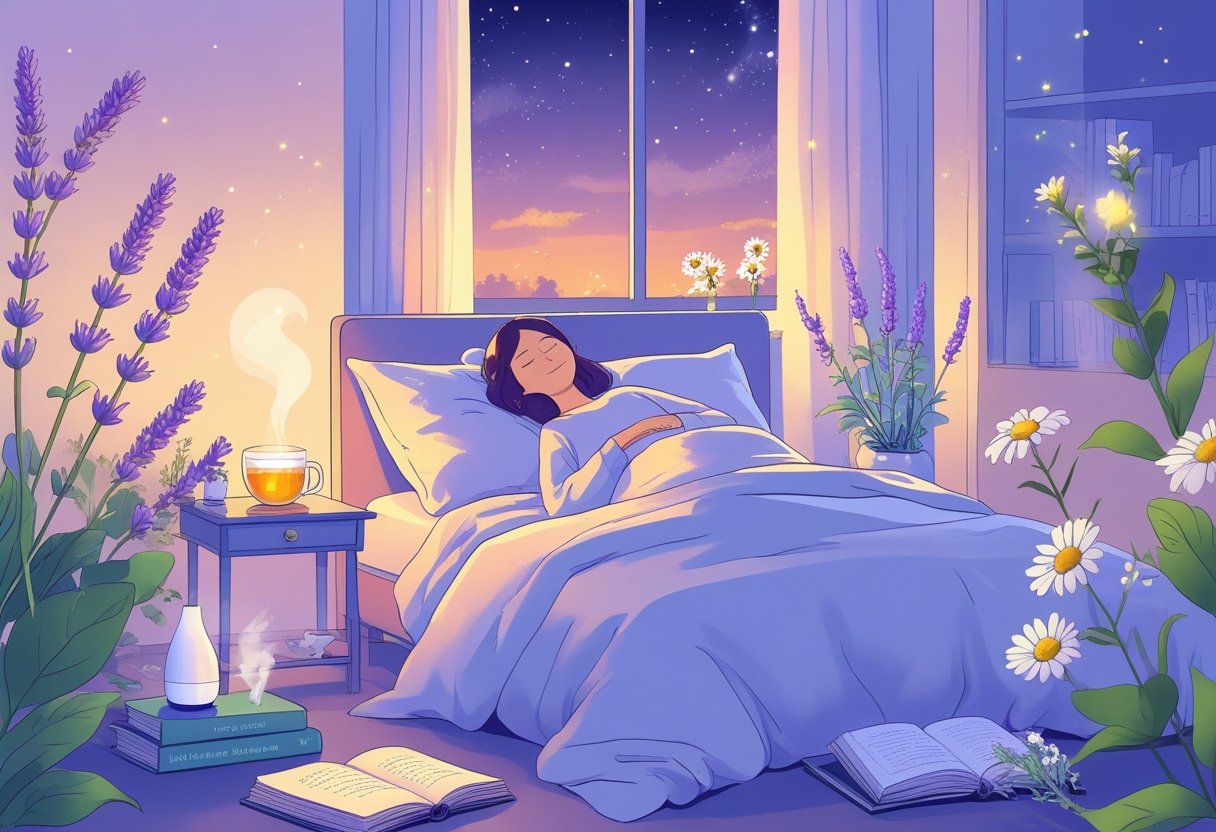
Physical activity improves sleep by making it easier to fall asleep and increasing deep sleep. The timing and type of exercise influence how well it supports rest and relaxation at night.
Exercise for Better Sleep
Exercise reduces tension and stress in the body, which helps with falling asleep. It also increases deep sleep, essential for feeling rested.
Studies show that regular physical activity lowers the time needed to fall asleep and decreases the number of times a person wakes up during the night. Even moderate exercise, such as walking or light jogging help.
Here are the key benefits of exercise for sleep:
- Speeds up falling asleep
- Increases deep sleep phases
- Reduces night awakenings
- Relieves stress and anxiety
People with insomnia often find exercise helpful since it calms the nervous system.
Best Time to Exercise
The best time to exercise varies for each individual, but generally, exercising earlier in the day provides the most benefits for sleep.
Physical activity raises body temperature and heart rate; if exercise occurs too close to bedtime, it can disrupt falling asleep. Most experts recommend finishing workouts at least 2-3 hours before going to bed.
Morning or afternoon exercise regulates the body’s internal clock, improving sleep quality and increasing deep sleep. For example, a brisk walk in the afternoon can promote relaxation later.
Some sleep problems require more than home remedies or natural aids. Knowing when to seek expert advice can prevent symptoms from worsening and lead to better insomnia solutions.
Recognizing When Home Remedies Aren’t Enough
If sleep issues persist beyond a few weeks despite natural remedies, it becomes necessary to consult a professional. Ongoing difficulty falling or staying asleep can disrupt daily life and affect mental health.
Watch for signs such as:
- Feeling tired even after sleep
- Trouble focusing during the day
- Mood changes, including irritability or anxiety
- Relying on sleep aids longer than recommended
Ignoring these symptoms may result in chronic insomnia that demands more than simple sleep support. When natural strategies fail, professional evaluation becomes crucial to identify underlying causes.
Working With Sleep Specialists
Sleep specialists provide targeted testing and treatments that go beyond home remedies. They might use sleep studies to detect disorders causing poor rest. Therapies often involve cognitive behavioral therapy, which teaches better habits and coping skills for insomnia. Depending on the diagnosis, medicines or other treatments may follow.
Collaborating with a professional allows solutions to tailor effectively to each case. Sleep experts offer ongoing support and adjust treatment plans as needed, improving the chances of restoring healthy sleep patterns.
A comfortable mattress affects sleep quality. It supports the body and reduces pressure points, which helps people fall asleep more easily. Without proper support, even natural remedies may fail to work as effectively.
Natural sleep aids such as chamomile, lavender, or melatonin target calming the mind and body. When combined with a cozy mattress, these remedies enhance relaxation and decrease sleep disruptions. Using a weighted blanket on a good mattress adds gentle pressure that increases the feeling of comfort and safety. This often helps people relax more quickly and stay asleep longer.
Here is a simple comparison showing how mattresses and natural remedies help sleep:
Comfort:
- Mattress effect: Supports body well
- Natural remedy effect: Promotes relaxation
Sleep Onset:
- Mattress effect: Reduces discomfort
- Natural remedy effect: Calms the mind
Sleep Quality:
- Mattress effect: Prevents tossing and turning
- Natural remedy effect: Reduces anxiety or restlessness
Combining these approaches allows the body and mind to work together to improve sleep. They complement each other but serve different purposes.
Choosing a mattress that suits personal comfort needs remains essential. Combining it with natural remedies like herbal teas or melatonin creates a balanced sleep routine that encourages better rest.
The DLX Premier Hybrid mattress offers a customizable sleep experience designed to suit a variety of comfort preferences. It features a 14-inch profile with multiple layers of high-quality foam and a supportive hybrid coil system that delivers excellent pressure relief and spinal alignment. It makes a great mattress for those seeking both comfort and support tailored to their needs.
The DLX Premier Hybrid also includes advanced cooling technology to regulate temperature throughout the night. Its hybrid coil system reduces motion transfer, allowing for uninterrupted rest. Enhanced edge support provides stability and maximizes the usable sleep surface.

Frequently Asked Questions
Natural sleep aids include dietary options, herbs, and practices that support the body’s ability to rest. Certain plants and lifestyle adjustments improve sleep quality and reduce the time needed to fall asleep.

